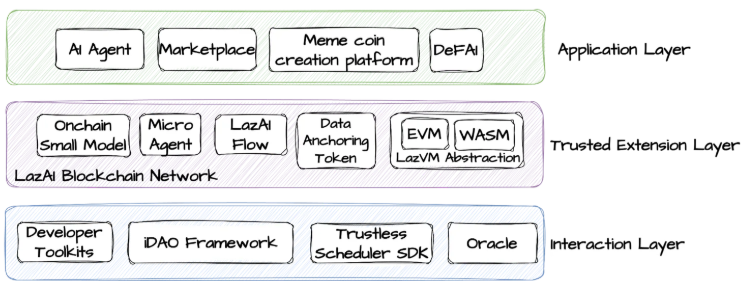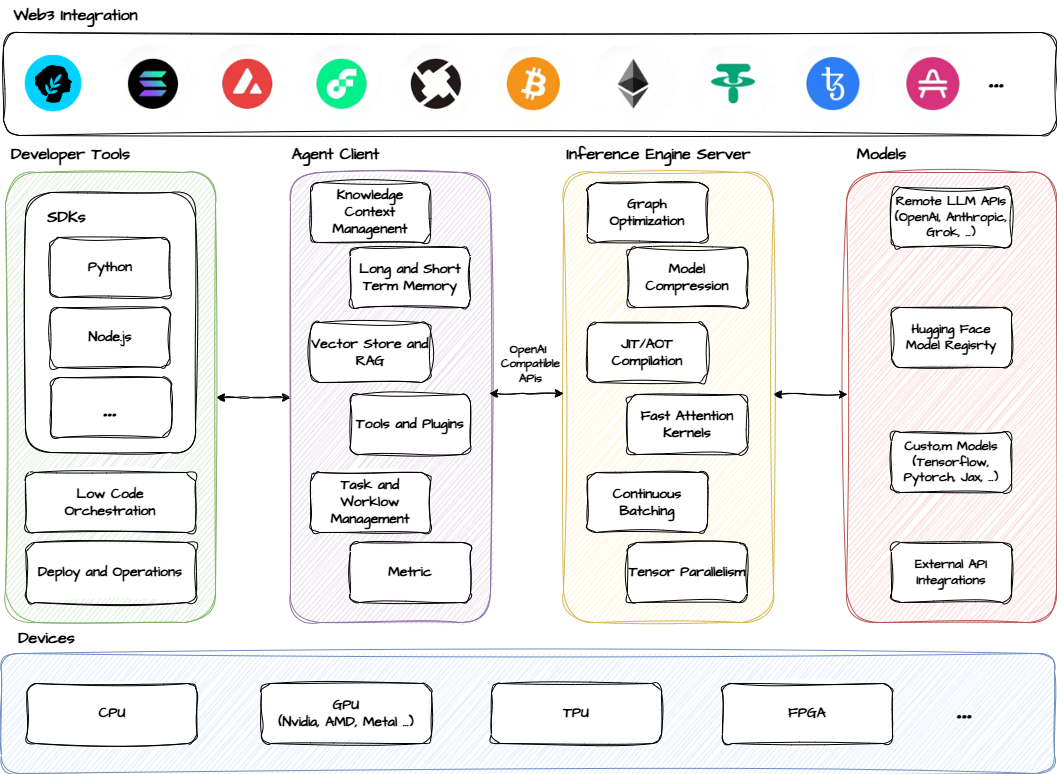Introduction
The year 2025 is poised to be a watershed moment, heralded as the ‘Year of the AI Agent,’ where the convergence of AI and Web3 is redefining the boundaries of technological innovation. At the core of this transformation stands Alith, a groundbreaking framework engineered to address fundamental AI challenges, establishing itself as an indispensable tool at this critical intersection of technologies.
Why are we confident in this vision? And how do we foresee the future within the AI + Web3 paradigm through the lens of the AI Agent Framework?
The Problem Landscape
The rapid advancement of AI technologies has illuminated critical challenges within centralized AI ecosystems. Faced with both macro and micro challenges in the age of AI, we cannot afford to stand idly by.
Macro-Level Challenges in the AI Ecosystem
- Data Sovereignty and Accessibility: Centralized platforms often monopolize access to data and resources, creating barriers for small-to-medium developers and limiting innovation.
- Privacy Concerns: Users lack control over their data, leading to privacy breaches and unverified data usage.
- Resource Inefficiency: Current models struggle with high inference costs, low efficiency, and limitations in accessing non-public data.
- Limited Decentralization: Governance models skew toward centralized authorities, resulting in opaque decision-making and inequitable profit distribution.
Micro-Level Challenges: Usability of Agent Tools
- Complexity: Agent tools often demand technical expertise, limiting accessibility for non-developers. Customization options are cumbersome and not intuitive.
- Performance Bottlenecks: High computational costs and low responsiveness reduce the efficiency and scalability of current agent frameworks.
- Fragmentation: Isolated ecosystems make integration difficult, leading to disjointed workflows and inconsistent user experiences.
- Lack of Web3 Integration: Many frameworks fail to leverage blockchain’s transparency and interoperability, missing opportunities for innovation in decentralized AI applications.
These problems hinder innovation and limit the participation of developers and developers-to-be from diverse backgrounds in the development of AI technology. This highlights the belief that many ordinary individuals will transition into developers, joining the wave of AI and Web3 innovation.
To address these issues, we have launched LazAI — a decentralized AI platform dedicated to building an open, transparent, high-performance, secure, and inclusive AI ecosystem.
What is LazAI and Alith
Alith is a decentralized AI agent framework tailored to harness the capabilities of the LazAI -a decentralized AI platform dedicated to building an open, transparent, high-performance, secure, and inclusive AI ecosystem. LazAI solves AI’s data alignment problem with novel technologies, from chaining Data Anchoring Tokens (DATs) to form a blockchain to self-contained iDAOs for entities, enabling composable open networks for AI and Web3 applications. On the LazAI platform, AI developers, data providers, and other stakeholders can collaborate through integrated development tools to jointly create high-quality AI assets. These assets can be used for further development or traded and shared within the platform. LazAI uses blockchain technology to ensure that all interactions are transparent and tamper-proof, with clear ownership and fair profit distribution for contributors.

Alith combines cutting-edge performance optimization with robust Web3 integration, addressing critical issues such as data sovereignty, efficient inference, and decentralized collaboration. By leveraging blockchain technology, Alith ensures transparent data governance and fair resource allocation, empowering developers and contributors within a decentralized AI ecosystem. Its cross-language SDKs for Python, Rust, and Node.js, alongside features like low-code orchestration and seamless deployment, make it both developer-friendly and highly scalable.

Why Alith
In LazAI, we believe that AI Agent is not a solution, but a goal we want to achieve and a problem that needs to be urgently solved. In the past 1 - 2 years, many AI Agent frameworks have emerged on the market, but they have not truly played the role of AI Agent. Restricted by the acquisition of internal data, the difficulty and cost of training and fine-tuning, as well as the high inference cost and low efficiency, AI Agents cannot be widely practiced, and the application scenarios are mostly concentrated in chatbots and so on. Therefore, we have launched the Alith AI Agent framework, which optimizes the model as much as possible on the basis of effectively utilizing data, improves the reasoning performance, and meets the needs of scene use.
Key Features of Alith
LazAI Gateway
- Basic wallet management, transfer, sending transactions, and contract interactions.
- LazAI’s privacy data, iDAO, DAT, verified computing and other core features.
High-Performance AI Training and Inference
- Utilizes Rust’s performance strengths combined with graph optimization and model quantization.
- Supports JIT/AOT compilation across CPUs, GPUs, and TPUs for dynamic scenario adaptability.
Developer Accessibility
- Provides cross-language SDKs (Rust, Python, Node.js) and low-code orchestration tools.
- Enables one-click deployment and operational functionalities to reduce onboarding complexity.
Web3 Ecosystem Integration
- Designed to seamlessly integrate with decentralized applications and blockchain networks.
- Ensures interoperability with existing Web3 and AI frameworks.
Scalability
- Supports complex workflows, from basic internal prompts to advanced low-level API customizations.
- Enables customization of roles, goals, tools, operations, and behaviors while maintaining abstract clarity.
Data Sovereignty and Privacy Reasoning
- Leverages LazAI blockchain for data traceability and privacy protection.
- Actively removes biased or harmful data while incentivizing diverse contributions.
Advantages of Alith
Addressing Data Monopolization
By utilizing blockchain-enabled governance, Alith resolves issues tied to data centralization. Its consensus-driven mechanisms empower contributors to retain ownership and control over their data, fostering a culture of equitable participation. The result is a vibrant ecosystem where data and resources flow seamlessly without traditional gatekeeping barriers.
Superior Inference Performance
Traditional AI systems face high costs and inefficiencies in inference tasks. Alith’s advanced optimizations—including Rust-based enhancements and quantization techniques—achieve low-latency, high-throughput performance, particularly in resource-constrained environments. This ensures robust AI applications across various devices and operational contexts.
Enhanced Developer Usability
Alith democratizes AI development through its SDKs and low-code capabilities. Developers, regardless of technical expertise, can rapidly create, deploy, and maintain AI agents. This accessibility reduces entry barriers, encouraging a broader spectrum of contributors to engage with AI technology.
Decentralized Governance and Trust
With its blockchain backbone, Alith establishes a decentralized governance framework that ensures fairness and transparency in asset distribution. This approach eliminates reliance on centralized authorities, fostering trust and collaboration among stakeholders.
Ecosystem Affinity
Alith’s compatibility with Web3 ecosystems enhances its versatility. It integrates seamlessly with existing decentralized infrastructures, enabling users to leverage blockchain’s security and transparency benefits. Additionally, it supports interoperability with frameworks like Langchain and Eliza, extending its utility across diverse applications.
How to Choose?
In short, if you need collaboration among different development teams and multiple Agents, and your scenario has special requirements for data acquisition, model fine-tuning, and high-performance inference, Alith will be your top choice. At the same time, Alith also provides the capability support offered by most AI Agent frameworks. To better understand Alith’s unique value, let’s compare it to other AI agent frameworks:
VS. Langchain
Langchain is a popular framework for building applications powered by Large Language Models (LLMs). It provides a wide range of tools and integrations for linking together different components of AI applications. However, Langchain focuses primarily on the orchestration of LLMs and lacks native support for Web3 and blockchain integration.
Alith is designed specifically for Web3, providing seamless integration with blockchain technology, decentralized data governance, and high-performance inference capabilities. If your project requires Web3 integration or decentralized AI workflows, Alith is a better choice. In addition, based on the Alith Python SDK and Node SDK, we can easily integrate Alith with Langchain and Langchainjs.
- Focus: Langchain excels in LLM orchestration but lacks blockchain integration.
- Advantage: Alith’s Web3 affinity and decentralized workflows make it superior for projects requiring robust blockchain interoperability.
- Synergy: Alith’s Python and Node.js SDKs enable seamless integration with Langchain, combining strengths for enhanced functionality.
VS. Eliza
Eliza is a lightweight AI framework designed to be simple and easy to use for Web3. It is ideal for developers who need to quickly prototype AI applications without dealing with complex configurations and workflows. Compared to Eliza, Alith has a cross-language SDK, high-performance inference, and support for complex workflows, providing a more powerful solution for developers who need to build scalable, high-performance AI agents with Web3 capabilities. In addition, based on the Alith Node SDK, we can easily combine Alith and Eliza to benefit from the Eliza Web3 ecosystem while making up for the disadvantages of the Eliza framework.
- Focus: Eliza prioritizes simplicity and prototyping.
- Advantage: Alith’s cross-language SDKs, high-performance inference, and scalability offer a more comprehensive solution for complex workflows.
- Synergy: Alith’s integration capabilities allow users to complement Eliza’s lightweight framework with high-performance features.
VS. Swarms
Swarms is another AI framework that emphasizes collaborative multi-agent systems. It allows multiple AI agents to work together to solve complex tasks. While Swarms excels in multi-agent collaboration, it does not provide the same level of Web3 integration or high-performance inference optimization as Alith, nor does it provide multi-language SDK support. Alith’s focus on Web3-friendly features, combined with its Rust-based performance optimizations, makes it a more suitable choice for developers looking to build decentralized, high-performance AI agents.
- Focus: Swarms emphasizes collaborative multi-agent systems.
- Advantage: Alith outperforms Swarms with its Web3 integration, high-performance inference, and cross-language SDK support.
VS. Rig
Rig is also an AI Agent framework written in Rust. Compared to Rig, Alith provides developers with easier-to-use Python and Node SDKs, and has made more inference optimizations for different devices such as CPU, GPU, etc., which is more suitable for developers who need to combine real-time data processing with AI and blockchain technologies.
- Focus: Rig is another Rust-based framework.
- Advantage: Alith’s ease of use, thanks to Python and Node.js SDKs, along with device-specific inference optimizations, makes it more developer-friendly.
Conclusion
The Alith AI Agent framework together with LazAI ecosystem exemplifies a forward-thinking approach to AI development. Its decentralized, high-performance, and developer-friendly design addresses long-standing challenges in traditional AI ecosystems. By prioritizing inclusivity, privacy, and interoperability, Alith stands poised to redefine how AI agents are built, deployed, and governed.